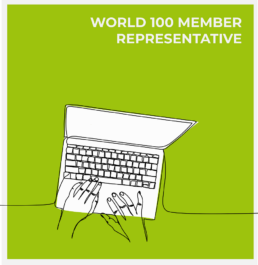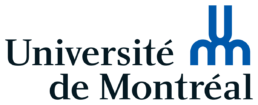
W100 Representative
Deeply rooted in Montréal and dedicated to its international mission, University of Montréal (UdeM) is a leading research university.
With its affiliated schools, Polytechnique Montréal (engineering), and HEC Montreal (business), University of Montréal is one of the largest university complexes in North America.
Situated on the northwestern flank of Mount Royal, one of North America’s finest urban parks, University of Montréal proudly reflects the welcoming multicultural city after which it is named. One out of every four students at University of Montréal comes from outside Canada. Montréal is known for its cultural vitality, safety and low cost of living.
With its 14 faculties and its affiliated schools, University of Montréal has over 66,500 students and 2,400 professors and researchers.
The Latest from University of Montréal
#SCIENCE | 🚲🧠 Pédaler en étudiant, bonne ou mauvaise idée? Une étude menée à #umontreal évalue l’impact des bureaux actifs sur l’attention, la mémoire et l’anxiété.
En savoir plus 👇

Pédaler et réfléchir en même temps
Combiner mouvement et apprentissage, une fausse bonne idée? Marie-Eve Mathieu et son étudiant François Dupont ont v...
liens.umontreal.ca
#SPORT | ⏳🏅 13 heures de décalage, 5 jours d’adaptation! Une étude menée à #umontreal révèle comment l’équipe canadienne de patinage de vitesse surmonte les effets du jetlag deux fois plus vite que prévu.
En savoir plus 👇

S’adapter à 13 heures de décalage: le défi de l’équipe canadienne de patinage de vitesse
Des chercheurs ont analysé la façon dont les membres de l’équipe canadienne de patinage de vitesse courte piste...
liens.umontreal.ca
#SANTÉ | 🧘♂️🧑🦳 Moins de stress, plus de résilience! Une étude menée à #umontreal révèle que le programme O’stress aide les aînés à mieux gérer l’anxiété et à réduire leur niveau de cortisol.
En savoir plus 👇

Stress et personnes âgées: une intervention novatrice qui le fait diminuer
Une étude a démontré que le programme O’stress a permis aux personnes âgées qui l’ont suivi de diminuer l...
liens.umontreal.ca
#TRAVAIL SOCIAL | 📖👶 «En route vers ta visite» : un outil pour les visites supervisées. Inspirée d’un ouvrage américain, cette trousse québécoise, développée par des expertes de #umontreal, soutient les enfants en placement.
En savoir plus 👇

«En route vers ta visite»: un album jeunesse pour accompagner les visites supervisées
Des expertes en intervention psychosociale ont conçu une trousse pour accompagner les enfants lors de visites supervi...
liens.umontreal.ca
#CRIMINOLOGIE | 📱👥 Les gangs de rue sur les médias sociaux : influence ou recrutement? Une étude de #umontreal, menée par Francesco Carlo Campisi, analyse leur présence en ligne et ses nuances.
En savoir plus 👇

Gangs de rue: une forme de marketing d’influence sur les médias sociaux?
À quoi ressemble l’utilisation des médias sociaux par les membres des gangs de rue canadiens? Servent-ils vraiment...
liens.umontreal.ca
#HISTOIRE | 📚🌍 Lyns-Virginie Belony : faire rayonner l’histoire d’Haïti
Nouvelle professeure adjointe à #umontreal, elle enseigne l’histoire des Caraïbes et d’Haïti pour déconstruire les clichés et offrir une perspective nuancée.
En savoir plus 👇

Lyns-Virginie Belony: enseigner l’histoire d’Haïti
Lyns-Virginie Belony rejoint les rangs du Département d’histoire de l'UdeM à titre de professeure adjointe.
liens.umontreal.ca
#PSYCHOÉDUCATION | 📺👦 Violence à l’écran : quel impact sur les jeunes? Une étude de #umontreal révèle que l’exposition précoce à des contenus violents peut favoriser des comportements antisociaux chez les garçons à l’adolescence.
En savoir plus 👇

Violence à l’écran: quelles conséquences sur les enfants qui y sont exposés?
Une étude montre que les garçons exposés à du contenu violent à l’écran pendant les années préscolaires é...
liens.umontreal.ca
#PHILOSOPHIE | 📚✨ Heidegger et Gadamer, une correspondance inédite. Jean Grondin, professeur à #umontreal, codirige la publication des lettres échangées entre ces deux figures majeures, révélant leurs idées et leur époque.
En savoir plus 👇

Parution de la correspondance inédite entre Heidegger et Gadamer
La publication de la correspondance entre Gadamer et Heidegger, codirigée par le professeur de philosophie Jean Grond...
liens.umontreal.ca
#RECHERCHE | 🧪✨ Vers des thérapies ciblées pour les cancers pédiatriques. Des chercheurs de #umontreal et de l’IRIC explorent de nouvelles molécules prometteuses pour traiter les leucémies à haut risque chez l’enfant.
En savoir plus 👇

De petites molécules pour traiter les cancers pédiatriques
Des scientifiques de l'UdeM et de l'IRIC ont mis au point une nouvelle plateforme de découverte de médicaments p...
liens.umontreal.ca
The university has a long list of illustrious graduates including: Roger Guillemin, co-recipient of the 1977 Nobel Prize in Physiology or Medicine; Louise Arbour, former chief prosecutor of the International Criminal Tribunals for the former Yugoslavia and Rwanda; Joanne Liu, international president of Doctors Without Borders; and the late Pierre Elliott Trudeau, one of Canada’s best-known prime ministers
More than 1,000 UdeM students go abroad each year
University of Montréal has 10,000 international students, making it one of Canada’s most international universities
The Université de Montréal was founded 1n 1878, as a satellite campus of the Université Laval, with three faculties: theology, law and medicine.
Montrealer by its roots,international by vocation
The University of Montréal has a truly international environment. With 10,000 international students, the university was previously named Canada’s third most international university, by a Times Higher Education ranking.
The university encourages student mobility. It has some 600 agreements that link the University of Montréal to higher education establishments located in 65 countries which provide a range of opportunities for its students to collaborate with their peers from all over the world and study abroad.
University of Montréal is also part of the G3. The G3 is a group of three major French language universities: Université de Genève, Université de Montréal, and Université libre de Bruxelles. G3 universities have created a common fund to help initiate new partnerships. The Strategic Project Development Program for Teaching and Research is one of the main vehicles for developing collaborations within the G3. The program is funded equally by all members of the group.
These universities have common interests and share similar goals in the areas of teaching, research, and service to society and the international community. The G3 aims to create innovative collaboration models in training, teaching, and research. It positions itself as a reference within the Francophonie.
Profile
- Proud Montrealer: Just like the city whose name it bears, the Université de Montréal is cosmopolitan, cultured, scientific and creative
- International leader: The teaching of its professors, the rigor of its researchers and the results of its students allow UdeM to remain in the forefront of the best universities in the world year after year
- Exemplary citizen: Committed, green and civic-minded, the entire Université de Montréal community takes sustainable actions for the city and for the inhabitants of the planet
One of the three foremost university research hubs in Canada
£597.2M
Research income
465
Research units
University of Montréal attracts over $500 million in research funding every year, making it one of the three foremost university research hubs in Canada.
Many renowned laboratories were born at University of Montréal, including: MILA, the world’s leading university research centre in deep learning; the Institute for Research in Immunology and Cancer (IRIC), one of the most productive in its domain; and the Centre de recherche en droit public (CRDP), the most comprehensive public-law research centre in Canada.
The University’s scientific research is overseen by Vice-Rectorate of Research, Discovery, Creation and Innovation. They ensure the development of research initiatives and collaborations in the University’s three salient research areas: the humanities and social sciences, natural sciences and mathematics, and health and biomedical sciences.
Become a Member
The World 100 Reputation Network is a group of the best universities in the world, delivering research that enhances reputation and offering leaders the chance to develop their own careers on a global stage. Members benefit from events and study tours, training, monthly media monitoring, and unique reputation research to provide institutional advantage.


